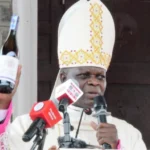The Trades Union Congress (TUC) of Ghana has escalated its demand for urgent government action to combat illegal gold mining, locally known as “galamsey,” warning of intensified pressure if the environmental and social crisis persists. The TUC’s statement follows widespread concern over galamsey’s devastating effects on Ghana’s water bodies, forests, farmlands, and public health.
During a fact-finding visit to the polluted Birim River in the Eastern Region, TUC Secretary-General Joshua Ansah criticized the government’s response, labeling recent engagements with civil society groups as “unproductive.” “Enough of the meetings and advocacy, we need action now. Galamsey must stop,” Ansah declared, urging stricter enforcement of mining laws, prosecution of offenders, and land reclamation efforts.
Galamsey, meaning “gather and sell,” has wrought havoc in Ghana, a leading African gold producer. Illegal mining operations have polluted rivers with mercury, decimated cocoa farms, and jeopardized livelihoods of farmers, fishermen, and rural communities. The TUC highlighted health risks from contaminated water and economic losses, particularly in Ghana’s vital cocoa sector, as polluted farmlands threaten production.
Ansah attributed the crisis to Ghana’s centralized land administration system, which he said restricts traditional authorities’ ability to curb illegal mining. “This system enables galamsey to flourish,” he noted, accusing some government officials, traditional leaders, and politicians of complicity. The TUC has vowed to use lawful measures to pressure the government, including advocating for alternative livelihoods for youth drawn to galamsey due to unemployment.
The TUC’s warning builds on a nationwide strike by Organised Labour on October 10, 2024, exactly a year ago today, protesting government inaction. Environmentalists and local communities echo the TUC’s concerns, citing rising water treatment costs and health issues from mercury exposure. Despite initiatives like Operation Halt, critics argue the government’s efforts lack consistency and impact.
The TUC is pushing for systemic reforms, including investigations into those fueling galamsey, stronger mining regulations, and sustainable practices to protect Ghana’s natural resources. Without immediate action, the country faces worsening environmental degradation, economic losses, and social unrest.
As public frustration grows, the TUC’s campaign could galvanize broader action against one of Ghana’s most pressing challenges. The union says it remains committed to ensuring accountability and safeguarding the nation’s ecosystems and communities.




